Did you know that nearly one in three cats worldwide will face a major infectious disease in their lifetime—but up-to-date cat vaccines can prevent most of these devastating illnesses? As a responsible cat parent, understanding what vaccinations do cats need is crucial for your pet’s lifelong health and happiness. This comprehensive guide pulls back the curtain on cat vaccinations, delivering everything you need to know—from saving lives to demystifying core and non-core vaccines, schedules, costs, and calming those “Is it really necessary?” worries. Whether you care for a daring outdoor explorer or a sleepy indoor fluffball, it’s never too late to put your cat's health first.
Did You Know? The Truth About What Vaccinations Do Cats Need—And Why Cat Vaccines Save Lives
"According to the American Veterinary Medical Association, timely cat vaccinations help prevent diseases responsible for thousands of feline deaths annually."
- Learn surprising facts about cat vaccine adoption rates and why some owners skip essential cat vaccinations

Most cat owners want their pets to stay happy and healthy. Yet, studies show that nearly 30% of cats miss out on at least one vital core vaccine due to confusion, misinformation, or the mistaken belief that “indoor cats don’t need shots.” This risky gap has real consequences: unvaccinated cats are far more likely to catch infectious diseases like feline distemper or even rabies, which can have life-threatening outcomes for both pets and people. Understanding what vaccinations do cats need is the key to giving your furry family member the best defense against invisible threats lurking everywhere—from outdoor neighbors to a simple visit to the vet or groomer. Don’t let the myths and mixed messages jeopardize your cat's well-being; learning the facts about cat vaccine schedules and requirements puts your cat on track to thrive.
Essential Guide: What Vaccinations Do Cats Need to Thrive?
- Breakdown of cat vaccines your pet really needs for long-term cat health
- Overview of cat vaccination categories: core vaccine and non-core options
To build a strong shield against illness, cats rely on a mix of core vaccines and, when recommended, non-core vaccines . Core vaccines are considered absolutely necessary for every cat, whether they live indoors, outdoors, or somewhere in between. These vaccines cover the most common, contagious, and dangerous diseases: feline viral rhinotracheitis, calicivirus, panleukopenia, and rabies. Protecting your cat with these shots guards their immune system from viral infections that can quickly become catastrophic in unprotected and even previously healthy cats.
Non-core vaccines are recommended based on lifestyle, environment, risk exposure, and your veterinarian’s advice. These may shield your cat against less common, yet serious, infections such as feline leukemia and Bordetella. The right combination keeps your feline's cat health robust from kittenhood through all stages of adulthood, minimizing long-term health risks and hospital visits. Always consult your vet when planning a personalized cat vaccination schedule .
Core Cat Vaccines Explained: What Vaccinations Do Cats Need According to Vets
Feline Viral Rhinotracheitis, Calicivirus, and Panleukopenia: Why These Core Vaccines Matter
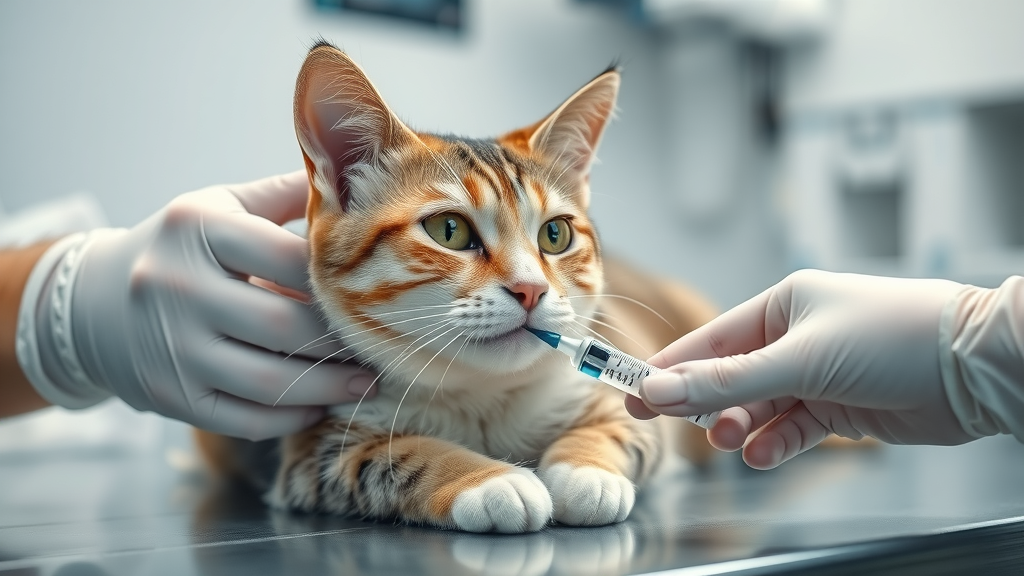
Every healthy cat—no matter the breed or age—should receive core vaccines that protect against feline viral rhinotracheitis, calicivirus, and panleukopenia. Collectively known as the FVRCP shot, these core vaccines shield your pet from a trio of dangerous viral diseases :
- Feline Viral Rhinotracheitis : Caused by the feline herpesvirus, this respiratory infection results in sneezing, eye/nose discharge, and can lead to serious upper respiratory complications.
- Calicivirus : Widely spread in shelters, calicivirus triggers mouth ulcers, fevers, and upper respiratory symptoms, potentially progressing to severe pneumonia in unvaccinated or immunocompromised cats.
- Feline Panleukopenia (distemper): A parvovirus attacking white blood cells, panleukopenia can cause vomiting, diarrhea, dehydration, and frequently ends with fatal consequences, especially in kittens.
Without these core vaccines, cats are left vulnerable to aggressive, highly contagious infectious disease outbreaks. Even indoor cats are at risk—these viruses can hitch a ride on shoes, clothes, or other pets, meaning thorough protection is non-negotiable for maintaining optimal cat health .
Rabies Vaccine in Cat Vaccination Programs: Protecting Pets and People
- Core vaccines every cat needs, regardless of indoor cat or outdoor cat lifestyle
The rabies vaccine is required by law in many areas and universally recognized by veterinarians as a core shot for all cats. Rabies remains one of the most deadly viral infections —transmitted from the bite of an infected animal, it is almost always fatal and poses serious risks to both pets and humans. Outbreaks still occur, which is why local and state governments enforce regular rabies vaccination for cats, regardless of whether they spend time outdoors.
Getting your cat vaccinated for rabies not only protects them but is vital for your family’s safety as well. Skipping this shot means even indoor cats are unprotected from rare, but possible, exposure through an escaped or infected animal. For pet owners, maintaining current rabies records keeps you compliant with animal control laws and gives peace of mind that your feline companion is safe from this deadly disease.
Non-Core Cat Vaccines: When Should You Include Additional Cat Vaccines?
Feline Leukemia Virus (FeLV) Vaccine: Which Cats Should Get It?
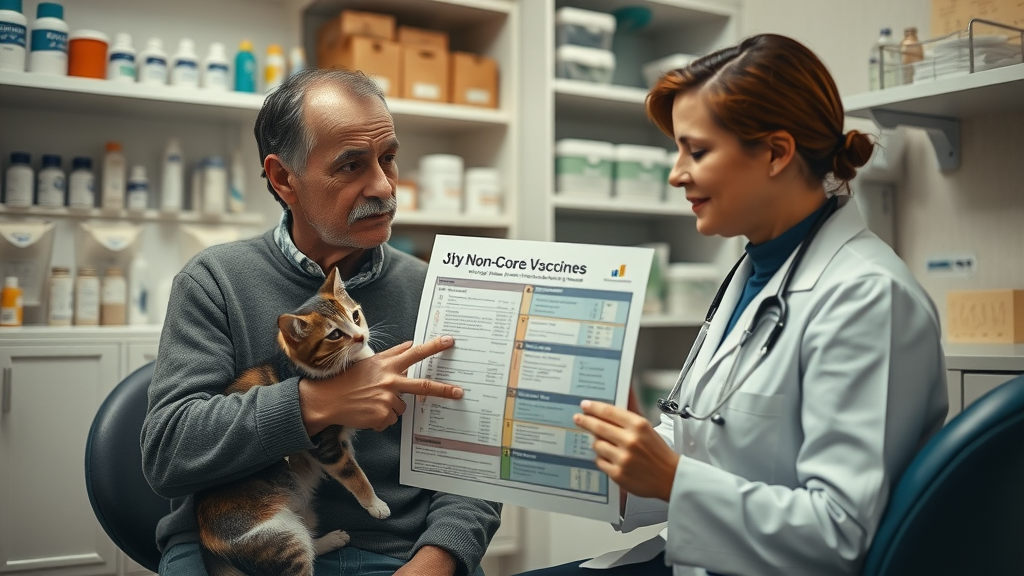
The feline leukemia virus (FeLV) vaccine is a non-core vaccine, but remains extremely important for cats at risk of exposure. FeLV is one of the leading causes of feline death due to its impact on the immune system and high potential for cancer and blood disorders. Kittens and young adult cats that spend time outdoors or live in multi-cat households with unknown vaccination history should absolutely receive the FeLV series.
Indoor cats who have little contact with other felines may not need this vaccine, but if there’s ever a risk that your cat could interact with an infected cat —at a window, in an outside enclosure, or through boarding—your vet may still recommend it. For protection against FeLV, talk with your veterinarian about timing and necessity as part of your pet’s overall cat vaccination plan.
Other Non-Core Vaccines: Bordetella, Chlamydia, FIV—Are They Right for Your Cat?
While not all cats need these additional vaccines, there are special circumstances where your vet might recommend them:
- Bordetella : Relevant for cats in boarding, shelter, or multi-pet environments; it helps protect against kennel cough, which can lead to upper respiratory infection .
- Chlamydia : Some kittens and cats in shelters or with chronic eye issues might benefit from chlamydia vaccines, reducing the risk of ongoing conjunctivitis and upper respiratory infection .
- Feline Immunodeficiency Virus (FIV) : Used less commonly, considered for high-risk, outdoor or feral cats.
Because these non-core vaccines address less widespread but still serious infectious diseases , it’s important to have an open conversation with your vet about your cat’s lifestyle, risks, and overall cat health . Together, you can decide if these extra shots should be added to your cat’s protection plan.
What Vaccinations Do Cats Need at Each Life Stage? Cat Vaccine Schedules by Age
Kitten Vaccination Schedule: Core Vaccines and Booster Timing
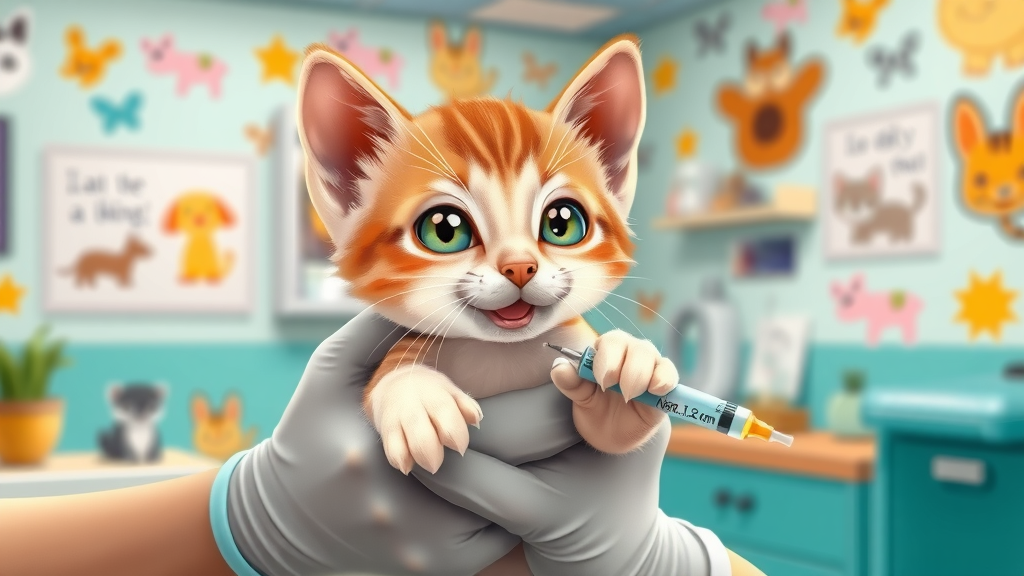
Kittens are born with weak immune systems and rely on a carefully timed vaccination schedule to build up protection against common feline diseases. Typically, the first round of core vaccines begins at 6-8 weeks of age, continuing with boosters every 3–4 weeks until 16–20 weeks old. This schedule helps ensure thorough immunity at the most vulnerable time in a kitten’s life.
Your vet will recommend the FVRCP shot at several intervals, with rabies given at or after 12 weeks of age, per local law. The feline leukemia vaccine is often suggested for kittens with outdoor access or uncertain parent backgrounds. Missing key boosters in this period can leave kittens exposed to infectious disease threats, so it’s important to stick to your vet’s recommended timeline—including annual or triennial boosters into adulthood.
Adult Cat Vaccination: Updating Core and Non-Core Vaccines
As your kitten grows up, sticking to an adult cat vaccination plan is the best way to maintain long-term cat health . Adult cats require regular boosters for FVRCP and rabies, generally administered either annually or every three years, depending on vaccine type and state requirements. Non-core vaccines, like feline leukemia virus or Bordetella, are updated according to the cat’s living situation or changes in health status.
If your adult cat has skipped a booster or you're unsure about vaccination history (such as for rescues), your vet may recommend restarting the series with two doses, spaced a few weeks apart, to reestablish immune protection. Keeping a clear record of vaccinations ensures your feline is always up-to-date and able to fend off infectious threats during every stage of life.
| Cat Age | Vaccine Type | Recommended Frequency |
|---|---|---|
| 6–8 weeks | FVRCP (core vaccines) | Every 3–4 weeks until 16–20 weeks old |
| 8–12 weeks | FeLV (if needed) | 2 initial doses, 3–4 weeks apart |
| 12–16 weeks | Rabies | 1 dose, as required by law |
| 1 year | FVRCP, Rabies, FeLV (if indicated) | Booster |
| Adult cats (over 1 year) | FVRCP, Rabies | Every 1–3 years, depending on local laws and recommendations |
Do Indoor Cats Need Cat Vaccinations? A Closer Look at the Cat Vaccines For Indoor Cats
Indoor Cats vs. Outdoor Cats: Different Cat Health Risks and Vaccine Necessities

It’s a common myth that indoor cats are safe from all infectious diseases —but that simply isn’t true. Even the most pampered indoor cat can be exposed to viruses and bacteria brought in on people, other animals, or household items. In contrast, outdoor cats face direct risks from wildlife, stray cats, and new environments, making a complete cat vaccine plan non-negotiable for both lifestyles.
While outdoor cats are at higher risk of coming into contact with rabid or infected animals , indoor cats may be vulnerable through occasional escapes, shared air vents, or during trips to the groomer or veterinarian. Ensuring your feline receives all core vaccines means your home remains a safe haven—free from the worry of unexpected cat health crises.
Which What Vaccinations Do Cats Need for Strictly Indoor Cats?
"Even indoor cats can be exposed to dangerous viruses via humans or open windows, making regular cat vaccines vital."
Indoor cats should always receive core vaccines: FVRCP and rabies. Depending on household dynamics, your vet may also recommend non-core shots like FeLV if a new (or previously untreated) cat is introduced, or if you care for fosters. Never assume inside-only habits mean your cat doesn’t require protection—for true peace of mind, a current vaccination plan is best.
Many pet parents are surprised to learn that diseases like feline herpesvirus and calicivirus can linger on shoes, clothing, or even through a cracked window. Routine vaccination appointments for indoor cats curb the risk of dangerous exposure, keeping your feline family member healthy and your mind at ease.
Side Effects of Cat Vaccines: Addressing Cat Health Concerns
- Common mild side effects and rare serious reactions after cat vaccinations
- How to monitor cat health after a cat vaccination appointment
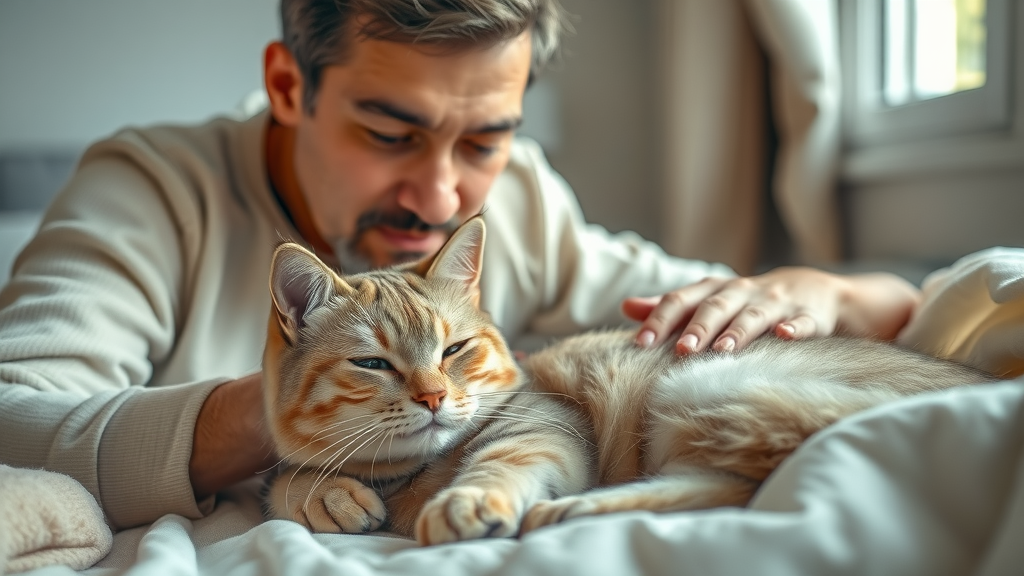
Most cats handle their vaccines with minimal fuss, but being alert to mild side effects is a smart part of caregiving. The most common reactions are low—slight sleepiness, decreased appetite, mild soreness at the injection site, or a tiny lump under the skin. These usually fade within 24-48 hours as the body’s immune system builds protection against dangerous viruses and bacteria.
Rare but serious reactions include severe swelling, hives, difficulty breathing, or collapse—these require immediate attention by your vet. After any cat vaccination appointment, keep an eye on your feline’s behavior, watch for persistent vomiting or swelling, and give them a quiet space to recover. Reach out to your veterinarian if you notice anything concerning, or if side effects linger for more than two days.
What Does Science Say? Cat Vaccination Myths and Evidence-Based Cat Health Advice
Fact vs. Fiction: Addressing Common Cat Vaccine Myths
"Skipping rabies vaccine doesn't just endanger your cat—it can put your entire household at risk."
- Science-backed benefits of consistent cat vaccination
Misinformation about cat vaccinations circulates online and in conversation with well-meaning friends. One of the most stubborn myths says “indoor cats don’t need vaccines.” In reality, outbreaks in pets often start with exposure brought into the home indirectly. Another popular misconception is that cat vaccines are dangerous or unnecessary after kittenhood; however, studies show ongoing vaccination is essential for long-term immunity and minimizing outbreaks.
Scientific evidence also confirms that risks from routine veterinary vaccines are extremely low—significantly outweighed by the severe, deadly nature of diseases like rabies, panleukopenia, and feline leukemia . Staying up to date means your furry friend is protected and helps create a safer community for pets and people alike.
Cost of Cat Vaccinations: How Much Do Cat Vaccines Typically Cost?
- Average pricing for cat vaccine packages and boosters
| Vaccine Type | Average Cost (USA) | Average Cost (UK) | Average Cost (AUS) |
|---|---|---|---|
| FVRCP (core vaccine) | $20–$40 | £25–£40 | $40–$60 AUD |
| Rabies vaccine | $15–$30 | £25–£40 | $25–$50 AUD |
| FeLV (non-core vaccine) | $25–$40 | £25–£40 | $30–$50 AUD |
| Other Non-Core | $20–$40 | £20–£35 | $25–$45 AUD |
| Annual booster package | $60–$120 | £50–£90 | $85–$150 AUD |
Prices for cat vaccine packages and booster appointments may vary by region, clinic, and specific needs. Many veterinary clinics and animal shelters offer bundled packages or community vaccine clinics to help reduce costs for pet families. Investing in vaccination is always more cost-effective than treating major diseases after the fact—and it spares your cat from suffering, stress, and potentially fatal conditions.
How to Prepare Your Cat for Vaccination: Cat Health Tips From Experts
- Pre-vaccine checklists and cat care steps
- What questions to ask your veterinarian about your cat vaccination plan
Prepping your feline for a smooth vaccine appointment starts with a calm environment—bring a favorite toy or blanket for reassurance. Make sure your cat is healthy: reschedule if your cat has been ill recently or is showing signs of respiratory or digestive upset. Give them a quiet, stress-free ride to the clinic, and carry recent medical or vaccination history records for your vet.
Key questions to ask at your appointment: What core and non-core vaccines would you recommend for my pet's lifestyle? What possible side effects should I watch for? When are boosters due, and how do I keep my cat calm during future visits? Proactive communication and preparation boost comfort for both you and your furry companion before, during, and after their shots.
"Visual guides can make understanding necessary cat vaccinations easier for new and experienced cat owners alike."
Watching a visual explainer about what vaccinations do cats need is a friendly way for all pet parents—new and experienced—to master the essentials of their cat’s health care. Ask your vet for recommended video resources, or check trusted veterinary websites for easy-to-follow animations and infographics on the importance of timely and complete cat vaccinations.
People Also Ask: Which Cat Vaccines Are Absolutely Necessary?
Answer: Most experts agree the core vaccines — FVRCP and rabies vaccine — are mandatory for all cats, regardless of lifestyle.
The FVRCP (feline viral rhinotracheitis, calicivirus, panleukopenia) and rabies vaccine are required protections for every feline, whether they spend time outdoors or live exclusively indoors. In some regions, rabies is mandatory under local law, but both are non-negotiable when it comes to safeguarding your cat's health.
People Also Ask: What Are the Mandatory Vaccines for Cats?
Answer: Mandatory cat vaccines typically include the core vaccines: rabies, FVRCP (feline viral rhinotracheitis, calicivirus, panleukopenia), and for some regions, feline leukemia is included.
Standard regulations call for core vaccines —rabies and FVRCP—to be administered to all cats. Areas with high rates of feline leukemia or outdoor exposure may require the FeLV vaccine as well. Check with your veterinarian for laws and best practices in your area to ensure complete compliance and protection.
People Also Ask: What Vaccines Do Indoor Cats Require?
Answer: Even indoor cats need core cat vaccines, particularly FVRCP and rabies vaccine, as these diseases can be brought into the home inadvertently.
No cat is completely safe from infectious agents, including those that cause upper respiratory infections or rabies, even if they never go outside. Core vaccine coverage is essential for indoor cats to block accidental exposure from other animals, visitors, or contaminated surfaces.
People Also Ask: What Are the Standard Vaccines for Cats?
Answer: Standard vaccines for cats are the core vaccines—FVRCP and rabies—plus optional non-core vaccines as recommended by your vet.
Most felines will receive a combination of FVRCP and rabies protection as standard. Based on age, health, and environmental factors, your vet may advise additional guarded coverage through non-core options like FeLV or Bordetella.
Frequently Asked Questions on What Vaccinations Do Cats Need
- How often should cat vaccines be updated? Most core boosters are given annually or every three years. Your veterinarian will create the safest schedule for your pet based on age, vaccine type, and risk factors.
- Can cat vaccinations cause illness? Vaccines rarely cause illness—most reactions are mild ( side effects like sleepiness or tiny lumps). Severe reactions are extremely rare. Always discuss any concerns with your vet before vaccination.
- Does pet insurance cover cat vaccinations? Many pet insurance plans offer wellness coverage that includes routine vaccinations and preventative care. Check your policy for details, or ask your provider directly.
- What are the risks of not vaccinating my cat? Unvaccinated cats are at increased risk for deadly diseases like panleukopenia and rabies, as well as serious outbreaks in multi-pet households or communities.
Checklist: What Vaccinations Do Cats Need at a Glance
- Quick checklist for kitten, adult cat, and senior cat vaccine reminders
- Core and optional vaccines by life stage
- Kittens (6-16 weeks): FVRCP series every 3–4 weeks, FeLV (if needed), rabies at 12–16 weeks
- Adult Cats (1+ year): FVRCP and rabies booster every 1–3 years, FeLV/non-core as advised
- Senior Cats: Review vaccine needs annually with your vet; health and exposure can affect recommendations
Key Takeaways for Cat Parents: What Vaccinations Do Cats Need
- All cats need core cat vaccines for long-term cat health
- Check vaccination schedule with your vet annually
- Both indoor cats and outdoor cats require protection
Ready to Keep Your Cat Healthy?
We can’t teach your dog to sit — but we can deliver great pet advice every month. 🐕 Subscribe to the newsletter and fetch some fun!
Ensuring your cat receives the appropriate vaccinations is vital for their health and longevity. The core vaccines recommended for all cats include the FVRCP vaccine, which protects against feline viral rhinotracheitis, calicivirus, and panleukopenia, and the rabies vaccine, which is often mandated by law due to its potential transmission to humans. ( webmd.com )
Non-core vaccines, such as those for feline leukemia virus (FeLV), are advised based on your cat’s lifestyle and risk factors. For instance, the FeLV vaccine is recommended for kittens and cats that spend time outdoors or live in multi-cat households. ( petmd.com )
Vaccination schedules typically begin when kittens are 6 to 8 weeks old, with boosters administered every 3 to 4 weeks until they reach 16 to 20 weeks of age. Adult cats require periodic boosters to maintain immunity, with the frequency determined by factors such as vaccine type and individual risk assessment. ( vcahospitals.com )
Even indoor cats should receive core vaccinations, as they can still be exposed to diseases through indirect contact. Consulting with your veterinarian will help tailor a vaccination plan that best suits your cat’s specific needs and environment. ( vcahospitals.com )
 Add Row
Add Row  Add
Add 


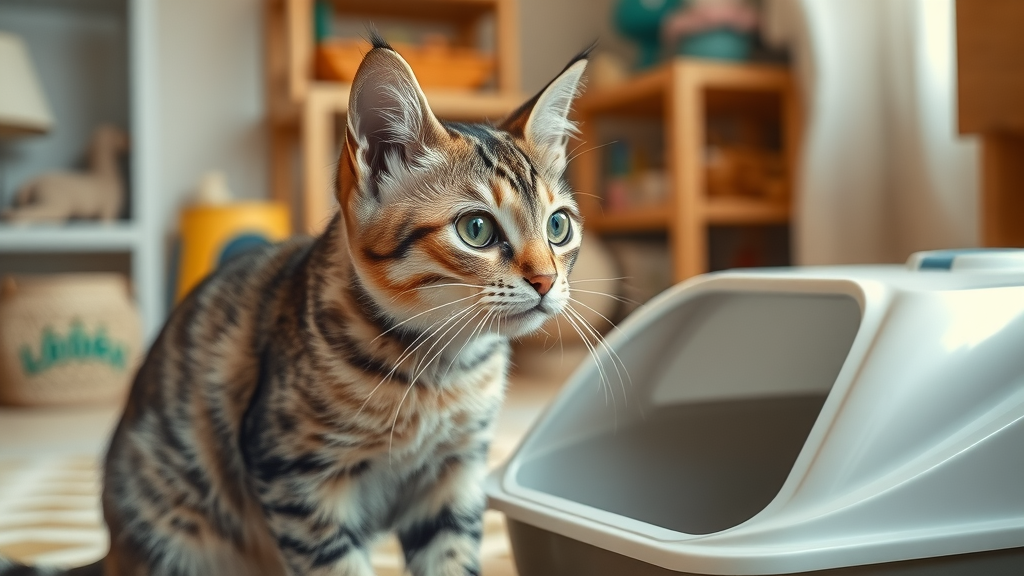

Write A Comment